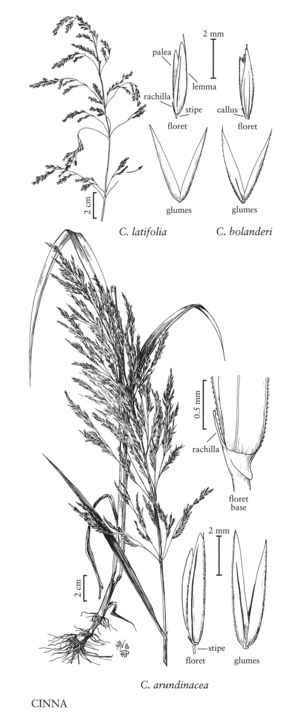Difference between revisions of "Cinna latifolia"
imported>Volume Importer |
GeoffLevin (talk | contribs) m (Restored umlaut in Gopp.) |
||
| Line 1: | Line 1: | ||
{{Treatment/ID | {{Treatment/ID | ||
|accepted_name=Cinna latifolia | |accepted_name=Cinna latifolia | ||
| − | |accepted_authority=(Trevir. ex | + | |accepted_authority=(Trevir. ex Göpp.) Griseb. |
|publications= | |publications= | ||
|common_names=Drooping woodreed;Slender woodreed;Cinna à larges feuilles | |common_names=Drooping woodreed;Slender woodreed;Cinna à larges feuilles | ||
| Line 26: | Line 26: | ||
-->{{#Taxon: | -->{{#Taxon: | ||
name=Cinna latifolia | name=Cinna latifolia | ||
| − | |authority=(Trevir. ex | + | |authority=(Trevir. ex Göpp.) Griseb. |
|rank=species | |rank=species | ||
|parent rank=genus | |parent rank=genus | ||
Latest revision as of 22:43, 3 December 2021
Culms 20-190 cm; nodes 4-9. Ligules 2-8 mm; blades to 28 cm long, 1-20 mm wide. Panicles 3-46 cm; branches usually spreading, sometimes ascending. Spikelets (2)2.5-4(5) mm; rachilla prolongations 0.1-1.3 mm, sometimes absent. Lower glumes (1.8)2.5-4(4.7) mm, 1-veined; upper glumes (1.9)2.5-4(5) mm, 1(3)-veined; stipes 0.1-0.45 mm; lemmas 1.8-3.8 mm, 3(5)-veined, awns 0.1-2.5 mm or absent; paleas 2-veined, with the veins very close together, or 1-veined; anthers 1, 0.4-1 mm. Caryopses 1.8-2.8 mm. 2n = 28.
Distribution
Conn., Mass., Maine, N.H., Vt., Wash., Ind., S.C., Wis., W.Va., Wyo., N.J., N.Mex., N.C., Tenn., N.Y., Pa., Alaska, Nev., Va., Colo., Alta., B.C., Man., N.B., Nfld. and Labr., N.S., N.W.T., Ont., P.E.I., Que., Sask., Yukon, Ill., Ariz., Calif., Idaho, Md., Ohio, Utah, Minn., Mich., N.Dak., S.Dak., Mont., Ky., Oreg.
Discussion
Cinna latifolia is a circumboreal species, extending from Alaska to Newfoundland in North America, and across Eurasia from Norway to the Kamchatka Peninsula, Russia. It grows in moist to wet soil in open coniferous or mixed forests, swamps, thickets, bogs, and streamsides, at 0-2600 m. It flowers in late summer and fall. Cinna latifolia differs from C. arundinacea in its 1(3)-veined upper glumes and its smaller spikelets; and from C. bolanderi in having 1 anther, shorter anthers and spikelets, and stipitate florets. A collection of C. latifolia from the Aleutian Islands had abnormally large (to 5.5 mm), often 2-flowered spikelets (Brandenburg et al. 1991). Cinna latifolia is a variable species for which varietal names have been proposed; because the variation is continuous, no varieties are recognized in this treatment.
Selected References
None.
